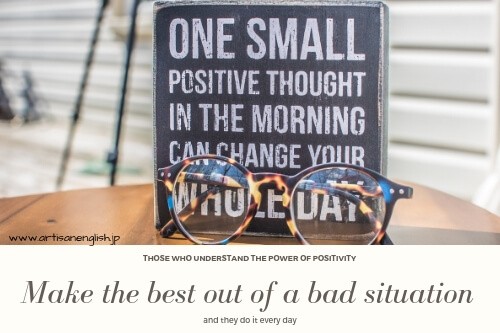
YouTube / iTunes / Spotify / Radio Public / Pocket Casts / Google Podcasts / Breaker / Overcast
Listen to ArtisanEnglish.jp posts & lesson intros here.
Expression: Make the best out of a bad situation
People with a positive outlook on life always try to make the best out of a bad situation.
When life gives you lemons, what do you do?
Some people would complain about it.
Others, with a more positive attitude, would make lemonade.
You could become a lemon salesperson, but you know there is always more money in value-added products.
Why sell lemons for 20 cents each when you can squeeze two into a jug, add some water, and sell the juice for about two bucks a glass?
See, 40 cents can quickly become twelve dollars with some thinking and elbow grease.
People who can make the best out of a bad situation look for the positive in difficult or adverse circumstances.
For some university graduates, their first job after university could be much better.
They find themselves not earning what they expected and not doing what they wanted to do.
It happens.
It happens to a lot of people.
Heck, initially, I earned more money as a university student than I made in my first job after uni.
I managed to turn it around.
It’s still a daily struggle, but whoever said life was easy?
There’s much talk in Canada, Japan and the United States about the high cost of post-secondary education.
Yeah, it’s expensive, but complaining and moaning about the challenging situation that most of us find ourselves in doesn’t change the day-to-day.
If you find yourself in an undesirable position, make the best of a bad situation and continue working towards getting the salary you feel you deserve and the job you want.
Positivity creates positivity.
If you have a lot of zebras, you’ll get more zebras.
The same goes for positivity.
If you have a lot of positivity, you will get more positivity.
Make the best out of a bad situation and work towards getting out of it and into a better one.
Flesch-Kincaid Readability Test
This post is understandable by someone with at least an 8th-grade education (age 13 – 14).
On the Flesch-Kincaid reading-ease test, this post scores 67.
The easier a passage is to read, the higher the score on a scale of 0 – 100.

